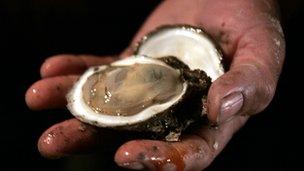Carlingford Lough oyster farmers want virus compensation
- Published

Oyster farmers whose stock has been hit by a virus in Carlingford Lough have said they feel abandoned by the Department of Agriculture.
A virus which causes oysters to die when sea water temperatures rise above 16 degrees Celsius has been detected in the lough.
One farmer reportedly lost 80% of his stock in two days.
The department has indicated there is no compensation scheme in place for lost stocks.
Harold Henning, who runs a shell-fish business in Kilkeel, pointed to compensation given to sheep farmers after blizzards in March this year.
"The precedence has been set now with the sheep farmers who rightfully got a hardship fund," he said.
"Mark McCaughan from DARD (Department of Agriculture and Rural Development) has said there was no mechanism in place for shell fish farmers.
"How can you discriminate between one type of of farming and another type of farming?"
DARD said ostreid herpes was detected on Wednesday following a sample of dead pacific oysters.
Chief Fisheries Officer Mark McCaughan said it was the latest incident to hit the aquaculture industry.
"From a salmon farm escape, to the notable jelly fish strike on a salmon farm off the Antrim coast, we've had losses in mussel farms, this is our fourth oyster virus outbreak and we've had the total loss of a trout farm as well," he said.
"None of those have attracted compensation because there isn't an automatic mechanism to put money into these events."
The department said there had been no other oyster mortalities reported in Northern Ireland.
"The deaths appear to be linked to the hot weather," a DARD spokesperson said.
"The virus appears to lie latent until water temperatures reach 16 degrees Celsius, at which stage the oysters begin to die very quickly.
"Temperatures have risen to 20 degrees Celsius in recent days which has significantly reduced dissolved oxygen levels in shallow areas where oysters are grown.
"Such temperatures are not unusually warm, but combined with the presence of the virus, conditions have resulted in oyster mortalities."
- Published24 July 2013
- Published29 March 2013